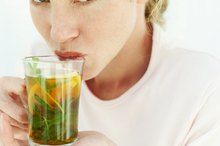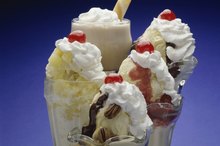Does Crystal Light Peach Tea Have Caffeine?
Crystal Light Peach Tea is a powdered instant iced tea mix. It is a quick way to enjoy the flavor of iced tea without brewing, then chilling, a glass of traditional tea. If you are sensitive to caffeine, or are on a caffeine-restricted diet, you may be concerned about the amount of caffeine present in Crystal Light Peach tea.
Effects of Caffeine
Caffeine is the world's most popular psycoactive drug, according to National Geographic 1. It is an integral part of many people's daily routine. Caffeine is considered safe, although it can have negative side effects such as headache, nausea, jittery feelings and insomnia. The effects of caffeine can last for several hours.
- Caffeine is the world's most popular psycoactive drug, according to National Geographic 1.
- Caffeine is considered safe, although it can have negative side effects such as headache, nausea, jittery feelings and insomnia.
Safe Levels
Does Decaffeinated Tea Have the Same Health Benefits As Caffeinated Tea?
Learn More
According to guidelines published by the South Dakota Department of Health, 300 milligrams of caffeine per day is a safe level for most adults. This is the equivalent of two or three cups of regular brewed coffee per day. Some people are more sensitive to caffeine and should consume less.
Children should consume no more than 35 to 40 milligrams of caffeine per day, according to the South Dakota Department of Health. Many children consume more than this through caffeinated soft drinks. Crystal Light Peach Tea is a good substitute for sweetened soft drinks, both in terms of caffeine and general sugar consumption.
- According to guidelines published by the South Dakota Department of Health, 300 milligrams of caffeine per day is a safe level for most adults.
Caffeine In Tea
All teas naturally contain caffeine, unless they undergo a decaffeination process. Decaffeinating tea does not remove 100 percent of the caffeine from the tea leaves, but it does reduce the caffeine to a level where most people, including children, will not feel its effects.
Decaffeinated Alternatives
Caffeine in Tea and Soda
Learn More
If you enjoy a glass of iced tea with dinner but find you have trouble falling asleep later, you may be experiencing caffeine-induced insomnia. Substitute a decaffeinated alternative such as Crystal Light Iced Tea, which only contains 11 milligrams of caffeine per 8 ounce serving, or about half the caffeine of regular Lipton brewed iced tea.
Hydration And Caffeine
The Mayo Clinic recommends that adults drink eight 8 ounce glasses, or 64 ounces total, of water every day 2. Crystal Light Peach Tea is marketed as a way to make water more palatable and therefore help you reach that 64 ounce goal.
There have been concerns over caffeine causing dehydration, but studies published by the University of Connecticut show that while caffeine does not replace electrolytes lost during heavy exercise, it does not contribute to dehydration. The small amount of caffeine in Crystal Light Peach Tea will not affect your hydration level.
- The Mayo Clinic recommends that adults drink eight 8 ounce glasses, or 64 ounces total, of water every day 2.
- Crystal Light Peach Tea is marketed as a way to make water more palatable and therefore help you reach that 64 ounce goal.
Related Articles
References
- National Geographic: Caffeine
- Mayo Clinic: Water: How Much Should You Drink Every Day?
- Meredith SE, Juliano LM, Hughes JR, Griffiths RR. Caffeine Use Disorder: A Comprehensive Review and Research Agenda. J Caffeine Res. 2013;3(3):114-130. doi:10.1089/jcr.2013.0016
- Richards G, Smith AP. A Review of Energy Drinks and Mental Health, with a Focus on Stress, Anxiety, and Depression. J Caffeine Res. 2016;6(2):49-63. doi:10.1089/jcr.2015.0033
- Brunyé TT, Mahoney CR, Rapp DN, Ditman T, Taylor HA. Caffeine enhances real-world language processing: evidence from a proofreading task. J Exp Psychol Appl. 2012;18(1):95-108. doi:10.1037/a0025851
- Koppelstaetter F, Poeppel TD, Siedentopf CM, et al. Caffeine and cognition in functional magnetic resonance imaging. J Alzheimers Dis. 2010;20 Suppl 1:S71-84. doi:10.3233/JAD-2010-1417
- Harrell PT, Juliano LM. Caffeine expectancies influence the subjective and behavioral effects of caffeine. Psychopharmacology (Berl). 2009;207(2):335-42. doi:10.1007/s00213-009-1658-5
- Lucas M, O'reilly EJ, Pan A, et al. Coffee, caffeine, and risk of completed suicide: results from three prospective cohorts of American adults. World J Biol Psychiatry. 2014;15(5):377-86. doi:10.3109/15622975.2013.795243
- Abdel-Hady H, Nasef N, Shabaan AE, Nour I. Caffeine therapy in preterm infants. World J Clin Pediatr. 2015;4(4):81-93. doi:10.5409/wjcp.v4.i4.81
- American Psychiatric Association. Diagnostic and Statistical Manual of Mental Disorders. 5th edition. Washington DC; 2013.
- Turnbull D, Rodricks JV, Mariano GF, Chowdhury F. Caffeine and cardiovascular health. Regul Toxicol Pharmacol. 2017;89:165-185. doi:10.1016/j.yrtph.2017.07.025
- Centers for Disease Control and Prevention. Alcohol and Caffeine. Updated October 23, 2018.
- Alsunni AA. Energy Drink Consumption: Beneficial and Adverse Health Effects. Int J Health Sci (Qassim). 2015;9(4):468-474.
- Lyngsø J, Ramlau-Hansen CH, Bay B, Ingerslev HJ, Hulman A, Kesmodel US. Association between coffee or caffeine consumption and fecundity and fertility: a systematic review and dose-response meta-analysis. Clin Epidemiol. 2017;9:699-719. doi:10.2147/CLEP.S146496
- U.S. Food and Drug Administration. Pure and Highly Concentrated Caffeine. Updated September 21, 2018.
- National Institute on Drug Abuse. Drugs, Brains, and Behavior: The Science of Addiction. Updated July 2018.
Writer Bio
Tricia Ballad is a writer, author and project geek. She has written several books including two novels, teaches classes on goal setting and project planning for writers, and loves to cook in her spare time. She is living proof that you can earn a living with a degree in creative writing.









